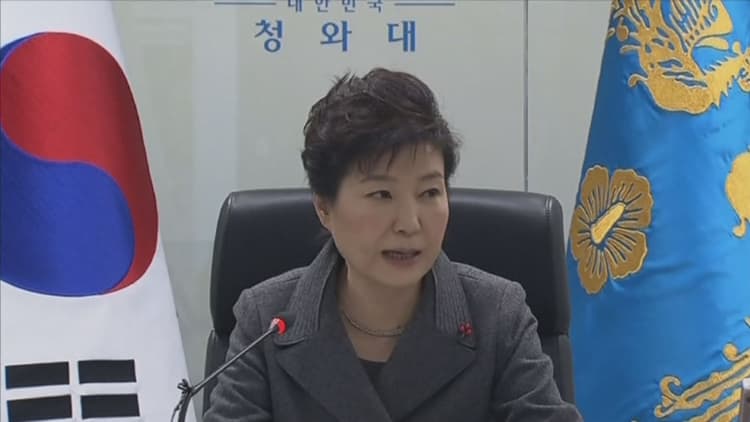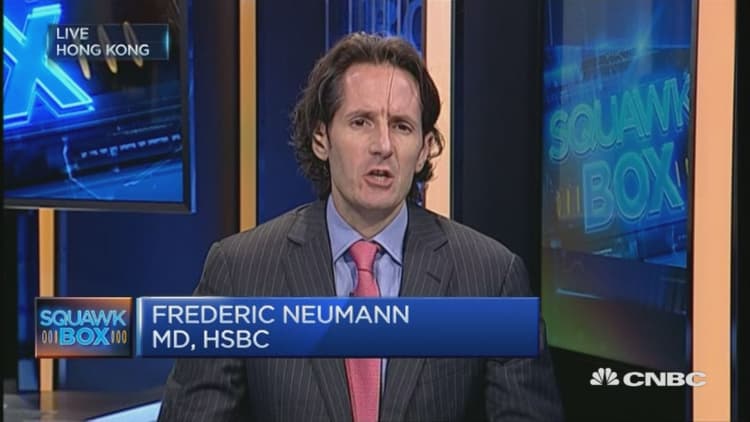
South Korean President Park Geun-Hye, under fire in what critics are calling the nation's biggest-ever political scandal, seems to be digging herself into a deeper hole.
The President replaced her prime minister, finance minister and public safety minister on Wednesday in an attempt to contain public anger over a spiraling corruption scandal that has hit the ruling Saenuri party. But the surprise cabinet reshuffle may do more harm than good.
"Despite her expectations, these snap nominations backfired. Critics angrily charged that the move is part of a strategy to maintain control and does not jive with plans being discussed to form a neutral cabinet with a prime minister empowered to dominant policymaking, with Park taking a back seat," Scott Seaman, senior Asia analyst at Eurasia, explained in a note.
Opposition parties will now likely use their combined majority in the National Assembly to hinder Park's attempts to install her candidates, he continued. Furthermore, Park is essentially powerless to ignore their objections given her current fragile standing, he added.
Park, 64, faces calls to resign or face impeachment for allowing a close friend, Choi Soon-Sil, to interfere in state affairs. Choi reportedly had access to classified documents without security clearance and was involved in presidential decision making, local media said. Choi, 60, is also accused of embezzlement, forcing conglomerates to make massive donations to nonprofit foundations, and getting preferential treatment from banks for loans.
Over the weekend, more than 10,000 people protested in Seoul and called for the President to step down, media widely reported. Choi was detained on Monday, and prosecutors raided eight banks on Tuesday to secure information on her transactions, Yonhap News said. Park's former senior aide Ahn Jong-beom was also detained on Tuesday for his suspected involvement in extracting funds from companies.
Despite the overwhelming public backlash, Eurasia puts the probability that Park will remain in office at 70 percent.
"Park will finish out her single, five-year term ending in February 2018, but she will likely renounce her membership in her party and be forced to turn over much of her authority to a new prime minister," Seaman explained, adding that her role would be restricted to a narrow range of foreign policy, defense, and national security issues.

Implications
"An arrangement involving a marginalized Park combined with a prime minister and cabinet that somehow protects both ruling and opposition parties' interests will be difficult to create and to manage," warned Seaman.
Still, he expected economic policy-making to continue as normal because politicians could not risk further angering an already enraged public.
As confidence in the government's leadership abilities plummets, many economists have warned of a hit to consumer spending, investment and even gross domestic product, but foreign policy is at stake too.
"One negative outcome of the scandal—whether Park stays or goes—will likely be a slowdown in efforts to improve relations with Japan. Specifically, the public and political opposition will ramp up attacks on Park's plans to conclude a bilateral agreement with Japan to share intelligence on North Korea and on her 2015 agreement to resolve the comfort women issue," Seaman flagged.
If the scandal prevented both deals from getting inked, Japan's frustration with South Korea would mount, he said.
'A flawed system'
The scandal also revealed how ill-equipped the nation's political system was during times of emergency, suggested one expert.
"If she steps down today, there would be a new presidential election within 60 days, and that would give opposition candidates a tremendous advantage because the public is so disillusioned with Park and her party," Sung-Yoon Lee, Kim Koo-Korea Foundation professor in Korean Studies at Tufts University, told CNBC's "Squawk Box."
However, none of the main opposition parties were prepared for such a "high-stakes" race, according to Reuters.
"The problem here is that there is no number 2 person within Korea's political system," Lee explained.
"You have a nominal figurehead prime minister, who is appointed by the president and acts like more of a secretary to the president. Unlike in the U.S., there is no qualified person to take over at a time of contingency," he said.

